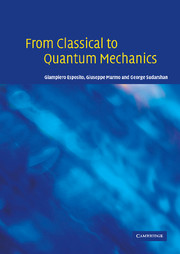Book contents
- Frontmatter
- Contents
- Preface
- Acknowledgments
- Part I From classical to wave mechanics
- Part II Weyl quantization and algebraic methods
- 9 Weyl quantization
- 10 Harmonic oscillators and quantum optics
- 11 Angular momentum operators
- 12 Algebraic methods for eigenvalue problems
- 13 From density matrix to geometrical phases
- Part III Selected topics
- References
- Index
9 - Weyl quantization
Published online by Cambridge University Press: 14 January 2010
- Frontmatter
- Contents
- Preface
- Acknowledgments
- Part I From classical to wave mechanics
- Part II Weyl quantization and algebraic methods
- 9 Weyl quantization
- 10 Harmonic oscillators and quantum optics
- 11 Angular momentum operators
- 12 Algebraic methods for eigenvalue problems
- 13 From density matrix to geometrical phases
- Part III Selected topics
- References
- Index
Summary
The commutator of position and momentum operators is first considered in the coordinate and momentum representations, and then in an abstract Hilbert space. The reader is then introduced to canonical operators with the associated canonical quantization of commutation rules, which consists of maps defined on a symplectic space and taking values in the set of unitary operators on a Hilbert space. If the symplectic space is finite-dimensional, all of its irreducible representations are unitarily equivalent. The Weyl exponentiated form of the commutation relations is described and investigated. One then arrives at the definition of Weyl systems, and it is shown how to recover from them the formulation in terms of self-adjoint operators which satisfy a generalized form of commutation relations.
Further topics are the Heisenberg representation for temporal evolution and the generalized uncertainty relations. Unitary operators associated with symplectic linear transformations are then considered, and, within this framework, translations, rotations and the harmonic oscillator are considered. The Weyl programme is then reassessed.
Lastly, the basic postulates of modern quantum theory are eventually studied: the probabilistic nature of the predictions of results of measurements; the correspondence between observables and self-adjoint operators on Hilbert spaces; the expected result of measuring an observable quantity; and the evolution of the state vector in systems which are not affected by any external influence. The chapter ends with an outline of rigged Hilbert space formalism and its applications.
The commutator in wave mechanics
In the first part of this book we studied wave mechanics within the framework of the Schrödinger equation.
Information
- Type
- Chapter
- Information
- From Classical to Quantum MechanicsAn Introduction to the Formalism, Foundations and Applications, pp. 339 - 374Publisher: Cambridge University PressPrint publication year: 2004
